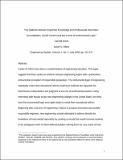The dialectic between expert knowledge and professional discretion: accreditation, social control and the limits of instrumental logic
Author(s)
Serona, Carroll; Silbey, Susan S.
DownloadSeron-Silbey.copy edited.pdf (561.0Kb)
PUBLISHER_POLICY
Publisher Policy
Article is made available in accordance with the publisher's policy and may be subject to US copyright law. Please refer to the publisher's site for terms of use.
Terms of use
Metadata
Show full item recordAbstract
Cycles of reform have been a constant feature of engineering education. This study suggests that these cycles are endemic because engineering begins with a particularly instrumental conception of responsible preparation. The instrumental logic of engineering repeatedly undermines educational reforms seeking to cultivate the capacities for discretionary interpretation and judgment at the root of professional practice. Using interviews with faculty at two new engineering colleges in the United States, we show how this instrumental logic once again leads to retreat from educational reform. Beginning with criticisms of engineering's failure to produce innovative and socially responsible engineers, new engineering schools attempted to address directly the limitations of instrumental rationality by creating curricula that would immerse students from the very outset of their engineering education in the ambiguous work of client-defined problem-solving. Rather than begin with the expertise grounded in mathematics and science and then teach how to apply that knowledge through known techniques, both programs asked students to become inquirers seeking knowledge, rather than implementers applying knowledge. As the programs sought legitimacy for their innovations through professional accreditation, however, the open-ended, exploratory processes of serendipitous learning were instrumentalized into a set of measurable procedures for acquiring standard, scientific expertise as the essential credential of the responsible engineer.
Date issued
2009-07Department
Massachusetts Institute of Technology. Anthropology ProgramJournal
Engineering Studies
Publisher
Informa UK (Taylor & Francis)
Citation
Seron, Carroll, and Susan S. Silbey. “The Dialectic Between Expert Knowledge and Professional Discretion: Accreditation, Social Control and the Limits of Instrumental Logic.” Engineering Studies 1.2 (2009): 101–127. Web. 27 Apr. 2012. © 2009 Taylor & Francis
Version: Author's final manuscript
ISSN
1937-8629
1940-8374